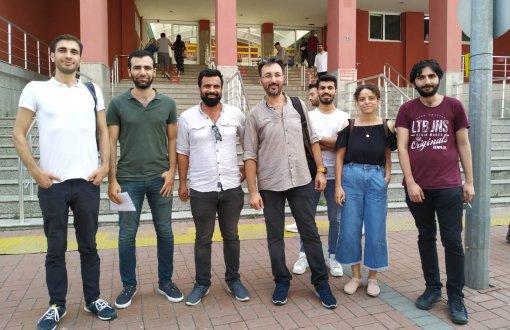Click to read the article in Turkish
15 students of Kocaeli University, against whom a lawsuit was filed after they attempted to celebrate Newroz at university campus, had their final hearings. Announcing its judgement, the Kocaeli 4th Penal Court of First Instance has ruled that the students shall be acquitted.
On March 23, 2016, a group of 30 students gathered in front of the social facilities at Kocaeli University's Umuttepe Campus for Newroz celebrations. The police did only allow the statement for the press to be held.
When the students attempted to hold the celebration, private security forces tried to move away them with shields. Afterwards, riot police forces intervened against the students and took 15 of them into custody.
After the students were released, a lawsuit was filed against them for allegedly "participating in an illegal protest march and insisting on not dispersing" under the Law no. 2911 on Meetings and Demonstrations.
The final hearing of the case was held at the Kocaeli 4th Penal Court of First Instance yesterday (June 27). Announcing its verdict after the statements of defense of defendants and their attorneys, all 15 students have been acquitted of the offense charged.
What is Newroz? Newroz refers to the celebration of the traditional Iranian peoples' New Year holiday of Nowruz in Kurdish culture. Before the Islamization of the Iranic peoples in Asia, the ancestors of the modern Kurds followed Zoroastrianism. In Zoroastrian doctrine, fire is a symbol of sight, goodness and purification. Angra Mainyu, the demonic antithesis of Zoroastrianism, was defied by Zoroastrians with a big fire every year, which symbolized their defiance of and hatred for evil and the archdemon. Newroz is mainly, in the modern age, affiliated with Kurds, who in turn make up the majority of the Alevi population, an Islamized version of the Zoroastrian religion. In Kurdish legend, the holiday celebrates the deliverance of the Kurds from a tyrant, and it is seen as another way of demonstrating support for the Kurdish cause. The celebration coincides with the March equinox which usually falls on 21 March and is usually held between 18 and 24 March. The festival has an important place in terms of Kurdish identity for the majority of Kurds, mostly in Iraq, Turkey and Syria. Though celebrations vary, people generally gather together to welcome the coming of spring; they wear coloured clothes and dance together. *Source: Wikipedia |
(DÇ/AS/SD)






.jpg)